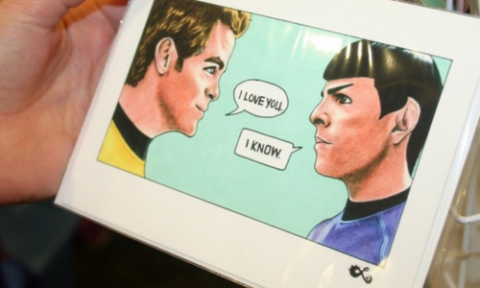‘Accepting me’: young people reflecting on fanfic and their identity

By Naomi Holford and Sara Clayson
Fanfiction is, quite simply, fiction written by fans. It’s a form of ‘transformative work’ – “creative works about characters or settings created by fans of the original work, rather than by the original creators” (Organisation for Transformative Works). Transformative works have a very long history (some would argue that ancient Greek tragedies, or Shakespeare’s plays, can be seen this way), and modern fan culture took off in the 1960s. Fans met at conventions and shared fanzines full of stories and artworks about characters from Star Trek, Doctor Who, or Blakes 7. But fanfiction – or fanfic – has grown hugely in popularity with the rise of the internet and social network sites, where relationships and groupings can form around fan activity, and people – especially young people – write, share, and talk about stories in these communities.
Online ‘affinity spaces’ (Jenkins, 2006) – like sites where people share fanfic – can offer rich ground for young people’s self-expression. By looking at young people’s interaction with fanfic through the lens of Childhood and Youth Studies, we’re interested in how young people experience fanfic as a way to explore a range of intersecting identities during these formative years, and how this links to their wellbeing.
We have been interviewing young women of 18-25 years who started participating in online fanfic communities in their early teens, asking them to reflect on how they feel their involvement in fandom influenced their emerging identities. We’ve been exploring their motivations for getting involved in fanfic and the communities they’ve experienced in these spaces. We wanted to know what being involved in fanfic meant to them at the time – and what it continues to mean to them now.
Some key themes have emerged from our conversations, suggesting that the creative and collaborative opportunities afforded by participation to young people in fanfic spaces leads to a greater awareness of diversity and inclusion and a better acceptance of themselves and others, particularly in relation to their sexualities, gender, and disabilities. Importantly, fanfic was seen as a more accessible form of creative writing. These young people saw themselves first and foremost as fans rather than as readers and writers.
Participants often talked about the importance of fanfic as a space to explore their emerging LGBT identities, during a time when there was more limited queer representation in other media, and how fandom served as a supportive community. One young writer referred to their ‘awakening’ – ‘like it was the first real introduction I’d had to queer relationships and it was almost my awakening’. Consequently, their experience of fanfic reading and writing in their early teens provided ‘the background that it felt like a softer landing then when I did figure myself out’.
Recognising ‘people like me’ in fanfic can also be an important aspect of identity and wellbeing for disabled and neurodivergent young people. One neurodivergent young person spoke about the benefits of reading stories with characters with the same conditions, and the connections felt with other readers who left comments about their own similar experiences.
Our interviewees were also writing about characters like themselves – including ‘bits about me’ in the stories. One interviewee talked about her childhood speech impediment, and the impact this had on her mental health growing up. She said that she’d felt unsupported by her family as a child, which had a very negative impact. She chose to write characters who had a similar speech impediment as herself – but, interestingly, she also wrote into her texts an ideal of the support she would like to have received when she stuttered. So this was an example of using writing to imagine better outcomes.
Being able to interact with more realistic representations of their disabilities or health conditions had a positive impact on some of these young people’s wellbeing. One interviewee shared her experience having an eating disorder. Reflecting on her stories, she realised that she had been trying to articulate feelings about her appearance and body image, that she couldn’t talk about for fear of judgment. By writing these feelings into her fanfic she was able to realise that she needed to listen to her feelings. Additionally, being part of a community where she could share her stories with other people who could relate helped her accept herself. As she said, ‘I started kind of accepting me’.
Our participants weren’t uncritically positive about fan communities. They spoke about conflicts that could arise within fan spaces. And while participants valued the sense of pride and self-worth that came from others reading, enjoying and commenting on their work, this could be a double-edged sword. Some participants reflected on times they felt pressured to write more, or to rely too much on the external validation of feedback, feeling bad if readership dropped.
But for the most part, these fan spaces, which offer an opportunity to imagine alternative outcomes for themselves, enabled these young people to navigate their sense of self in an inclusive and supportive way. Writing fanfic in community had a positive influence on our participants’ wellbeing – both as teenagers, and as they have transitioned into adulthood.
Image insert: Star Trek fanart (photo by Sarah Mirk) (Creative Commons 2.0 attribution licence)
